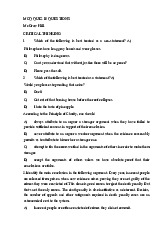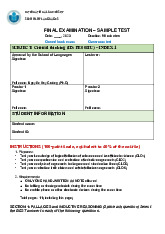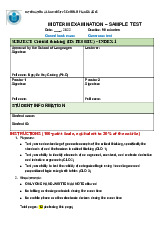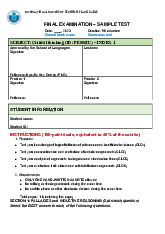













Preview text:
INT I ERNA E T RNA I T O I NAL UNIVE V RS E I RS T I Y T Y – – VNU V HCM NU C Ch C ap a t p e t r 8 EV E AL A UAT A I T N I G N A G R A G R U G MENT
“Our very eyes are sometimes, like our judgments, blind” - Shakespeare Eva E luat l in i g Argume gum n e ts
What “good argument” does not mean?
• argument whose conclusion I agree with • persuasive argument
• Well-written or well-spoken argument Wha Wh t t is i s a a G O G O O D O ARGUM A ENT? NT • Al A ll lp r p emise e s mise s a r a e r e t r t u r e u , e • Pr P e r mises mise s p r p o r v o i v d i e d e g o g o o d o d r e r as a o s n o s n s to t o a c a c c e c pt th t e h e co c nc n l c u l s u i s o i n o . n Eva E luat l in i g Argume gum n e ts This definition is Not fully adequate. What is a good argument?
A good argument is an argument that is either
deductively sound or inductively cogent
• deductively valid: the conclusion must be true if the premises are true.
• Both deductively valid and have all true premises are said to be deductively sound.
• inductively strong: the conclusion is probably true if the premises are true.
• Both inductively sound and have all true premises are said to be inductively cogent. Eva E luat l in i g Argume gum n e ts Ge G n e eral a lG u G i u de d l e iln i e n s e (Key questions): Are the pr p emi e se s s e s true u ? Is the argument de d d e ucti c vely l y v a v lild i or in i d n ucti c ve v l e y l y strong? Is the reas a on o i n n i g n g c o c rrect rrec ? Does the arguer commit any lo l g o ic i a c l a lfa l fa lac a i c es e ?
Does the arguer express his or her points cle l a e rl a y rl and pr p ec e ise s l e y l ? Are the premises rele l v e a v nt n to the conclusion? Eva E luat l in i g Argume gum n e ts Ge G n e eral a lG u G i u de d l e iln i e n s e (Key questions): Is the claim lo l g o ic i a c l a lly l y c o c nsistent? Do any claims con o trad n ic i t
c other claims made in the argument? Is the argument comp o le
l te? Is all relevant evidence
taken into account (given understandable limitations
of time, space, context and so on)? Is the argument fair
i ? Is the arguer fair in his or her
presentation of the evidence and treatment of opposing arguments and views? Evaluating Arguments Whe Wh n n is i s i t i t r e r a e s a on o a n b a l b e l e t o t o ac a ce c p e t p t a a p r p emise e ? mise Women are smarter than Men! Under what Men gossip more than Women! conditions is it reasonable to
Women are better leaders than Men! accept such
Men are more creative than Women! claims?
In general, it is reasonable to accept an un u s n up u p p ort r e t d e d cla cl im m as a tr t ue u when: •
The claim does not conflict with PERSONAL EXPERIENCE •
The claim does not conflict with BACKGROUND BELIEFS •
The claim comes from a CREDIBLE SOURCE. 1. 1 D . oe o s th t e h C e l C ai a m i Conf n lilc i t c t wi w tih t ou o r u Pe r rso s n o al a l Expe p r e i r e i n e c n e c s? s
• People often place too much trust in their own observation and experiences.
• Personal experiences are often less reliable than we think. We need to be
aware that “believing” is often “seeing” and that things are not always as they appear.
My dog is “as gentle as a kitten.” Got it! Really?
Critical thinkers recognize that their beliefs, hopes, fears,
expectations, and biases can affect their observations. 2. 2 . D oe o s e s t h t e h e Cl ai a m i Co m n Co flfilc i t c t with h ou o r u Ba B c a kg k r g o r u o n u d n Be B l e ie i f e s f ? s • Ba B c a kgr kg o r u o n u d n d be b lilef e s s –
– A vast network of conscious and
unconscious convictions we use as a framework to assess
the credibility of claims that can’t be verified directly. • “I “ t I wa w s a r s a r i a ni n ng n in i n K u K a u la a L u L m u pu p r u r la l st a st 3 1 3 s 1 t t Au A g u ust u . st ” .
Critical thinkers think very carefully about the beliefs they accept.
Never believe without sufficient evidence and never believe more
strongly than the evidence warrants. – Watchwords of the wise. 3. 3 D . oe o s th t e C e l C a l im i Co C m o e e fr f om o a Cr C e r di d b i l b e Sourc r e c ? e
Is the source a genuine expert or authority?
Does the source speak in his or her area of expertise?
Is the source biased or has some other motive to lie or mislead?
Is the accuracy of the source’s personal observations or experiences questionable?
Is the source contained in a source that is generally unreliable (e.g. gossip magazine) ?
Has the source been cited correctly or has been quoted out of context?
Is the issue one that can be settled by expert opinion?
Is the claim made by the source highly improbable on its face?
Critical thinkers must ask, “Are all premises true?” and “Do the
premises provide good reasons to accept the conclusion?” Exe E rci r se ci Ind n i d ca i t ca e t e wh w e h t e he h r e r or not o t i t wo w ul u d l d be b re r aso a n so a n ble l e t o t o a cce a p cce t p t the h e clai a m i ? m Wha h t a t cr i cr tieri r a i ? a ? • Bl B a l c a k c ca c ts t s bri r n i g n g b a b d a d l u l c u k c . k • I I r ea e d a d the h e e n e t n ir i e r e En E c n y c c y lo l pe p d e i d a i a Br B itia t n a n n i n c i a c a la l s a t t s u s mme u r mme r
(said by a stranger at a party). • Th T er e e r is i n o n o h a h r a d r d s c s i c e i n e t n ififc i ev e i v den e c n e c e t h t a h t a t s mo s k mo i k n i g n g i s i s a d a dic i t c itv i e v e (said by a tobacco company executive). • Gh G os o t s s t s re r al a lly l y ex e is i t s . t • Al A ile i n e s s ha h ve v e vi v s i i s tied e d th t e h e e a e r a th t h in n s o s me me fo f rm. r Refuting ti argume gum nts
• To refute an argument is to defeat it – to show
that the premises do not provide good reasons to accept the conclusion.
• There are two ways to refute an argument:
• (1) Show that a premise or a critical group of premises is false or dubious
• (2) show that the reasoning is bad - that the
premises do not provide adequate logical support for the conclusion. Showi ow n i g Pre g m Pre ises i Fal F se al • Showi w n i g n a pre r mi e s mi e s to t be o fa f l a s l e e is i su s ff f i f c i i c e i n e t n t to t re r f e ut u e t e h t e e ar a gu g ment.
Ex: (1) All presidents live in the White House. (2) Paris
Hilton is President. So, (3) Paris Hilton lives in the White House. • Fa F ls l e s i e r i r r el e e l v e a v n a t n p t r p emi e s mi e s wi w lll not r l e not r fu f t u e t t e h t e h ar a gu g m u en e t n . t
Ex: (1) All circles are squares. (2) All squares are
rectangles. (3) All rectangles are geometrical figures. (4)
So, all squares are geometrical figures. Sh S owing Pr P emises to be Dubio bi us • Demon mo s n t s r t a r t a i t n i g n g do d u o bt b : t
• Appeal to personal experience, common knowledge, or reputable source.
• Note a self-contradiction (either in a single premise or between premises).
• Show the premises is based on an unwarranted assumption. • Oth t e h r e r re r f e uta t t a i t o i n o n T e T c e h c ni n qu q es e : s
• Reducing to the absurd: Show the truth of a premise would
entail something clearly false (absurd).
• Present a counter-example: present an exception that shows a premise false.
• (arguer): All 20th Century presidents were rich.
• (you): Harry Truman wasn’t!
Showing That the Conclusion does Not Follow from the Premises.
• Show that the argument is either (a) deductively invalid or (b) inductively weak. • Most important questions:
• If deductive, does the conclusion follow necessarily from the premises?
• Are the premises relevant (is there a fal a llac a y)?
• Are the premises sufficient to support the conclusion?




